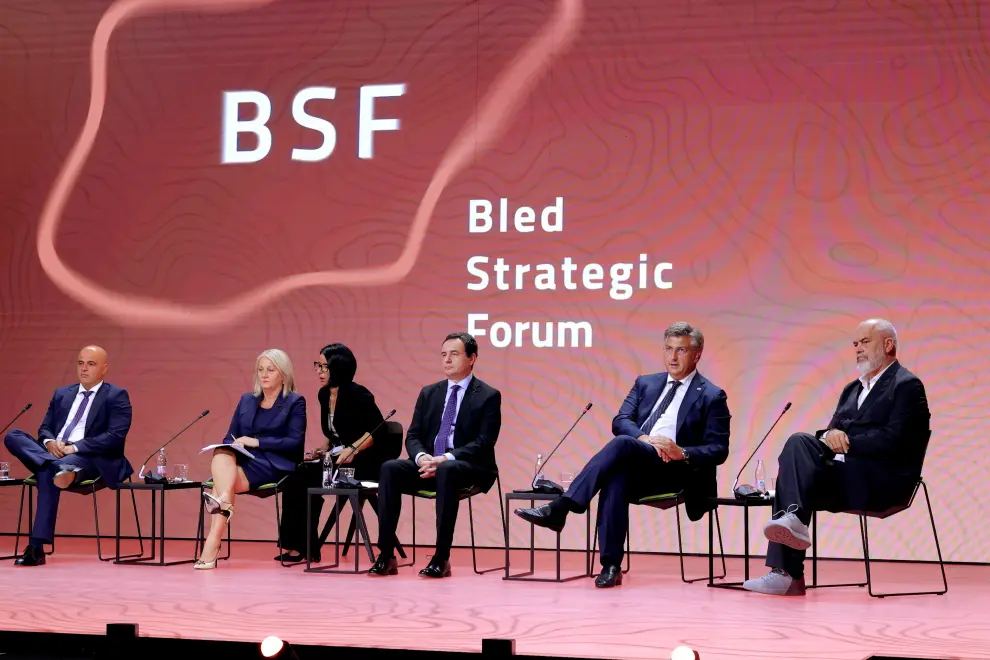EU president: W Balkans and EU must be ready for enlargement by 2030
European Council President Charles Michel addressing the opening of the Bled Strategic Forum.
Photo: Daniel Novakovič/STA
The EU and the Western Balkans must be ready for enlargement by 2030, European Council president Charles Michel said at the opening of the Bled Strategic Forum on 28 August. The region's leaders argued the process should be accelerated.
Michel underlined that a lot of work is still ahead and not only the future member states, but the EU as well will have to undergo reform.
For the EU to be stronger and safer, it needs "to reinforce our bonds and become more powerful in this way, it is time to tackle the challenge of enlargement," said Michel.
He believes that the Western Balkan countries should from now on be called future member states. "It is time to get rid of the ambiguity. It's time to face the challenges with clarity and with honesty."
The EU's next long-term budget will need to include common goals, he said. "This is, I know, ambitious, but it is necessary. It shows that we are serious. It will build momentum. It will give a transformative boost to reforms and it will generate interests, investment and better understanding."
He said that the EU leaders will be discussing enlargement at the future EU Council meeting. "We will take a stand on the opening of negotiations with Ukraine and Moldova, and I also expect Bosnia and Herzegovina, and Georgia to be back on the table."
Talking about the reforms faced by the Western Balkan countries, Michel highlighted the rule of law and human rights, before turning to bilateral and regional issues. "Resolving bilateral issues of the past may be more painful than reforms, but it's necessary."
He said that a "confidence clause" might be added to accession treaties of new member states to prevent them from blocking countries that have not yet entered the EU over unresolved issues.
Region's leaders find enlargement process too slow
The region's leaders expressed caution about the pace of EU enlargement. They argued that the process is already taking too long and should be accelerated.
Montenegrin Prime Minister Dritan Abazović said that 2030 is "too far," arguing that while countries in the region know exactly what they want, sometimes EU leaders do not know what they want.
Abazović said the EU should look at the Balkans not as a region of conflict but as a region that offers the EU the opportunity to develop, noting that enlargement is in the interest of the EU.
Borjana Krišto, Chairwoman of the Council of Ministers of Bosnia and Herzegovina, refrained from directly commenting on 2030. She said her country expected to start negotiations talks as soon as possible, but noted that the EU should be "more clear and determined when it comes to accession process".
Serbian Prime Minister Ana Brnabić did not directly comment on Michel's remarks either but she argued the region is tired of "moving goalposts" and the sense that nothing the countries do is good enough.
She said the countries in the region were a part of the European family of nations and it is "time to take the brave political decision to make us part" of that family.
Bled Leaders' Panel at the 2023 Bled Strategic Forum. Photo: STA
One of the biggest obstacles to enlargement in the region is the issue of Kosovo, which Serbia continues to treat as a part of its territory. Five EU member states have not recognised it as an independent country either.
Kosovo Prime Minister Albin Kurti acknowledged this is a problem, especially the non-recognition by member states, but he nevertheless remains optimistic about his country's prospects.
"We are optimistic about the times ahead ... and look forward to have more cooperation," which will benefit not just the region but the EU as a whole.
Albanian Prime Minister Edi Rama reacted to the 2030 target cynically. Referring to how fast Ukraine's membership bid had progressed after it was attacked by Russia, he jokingly wondered who should attack whom on the Balkans so as to accelerate the enlargement process.
Nevertheless, he remains "tragically optimistic" about the accession of countries in the region, describing the accession process as "the most incredible transfer of know-how on state building that humanity has created."
North Macedonia's Prime Minister Dimitar Kovačevski saw encouragement in Michel's statement that the EU will "validate its will for enlargement".
However, he noted that the enlargement process is taking too long: in 2003, when the EU officially confirmed the European perspective for the Western Balkans countries, North Macedonia was still Macedonia and Montenegro and Kosovo were not yet independent.



